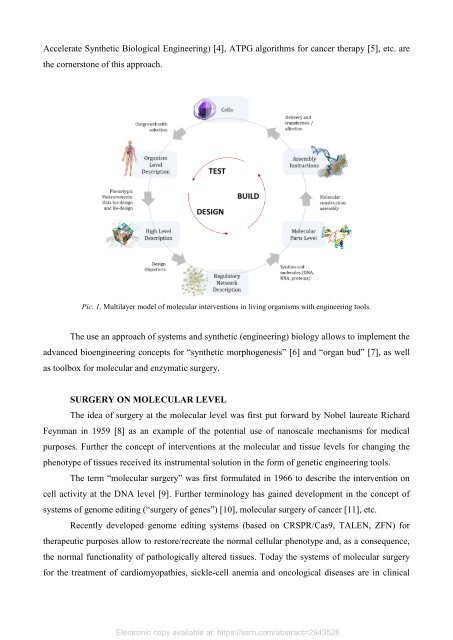Foundations for Molecular and Enzymatic Functional Surgery
This paper presents an approach of molecular and enzymatic surgery for treatment of human diseases, including opportunity for use of systemic biology methods in planning of surgical interventions, possible biological components of a “molecular scalpel”, and problems of standardization, medical ethics and clinical trials of the new pharma-surgical toolbox. In conclusions is proposed to consider of molecular and enzymatic surgery methods as realization of the principles of “functional surgery” and also further development of fast track surgery with attaining the modern concept of a personalized approach to surgical treatment of the patient.
This paper presents an approach of molecular and enzymatic surgery for treatment of human diseases, including opportunity for use of systemic biology methods in planning of surgical interventions, possible biological components of a “molecular scalpel”, and problems of standardization, medical ethics and clinical trials of the new pharma-surgical toolbox. In conclusions is proposed to consider of molecular and enzymatic surgery methods as realization of the principles of “functional surgery” and also further development of fast track surgery with attaining the modern concept of a personalized approach to surgical treatment of the patient.
You also want an ePaper? Increase the reach of your titles
YUMPU automatically turns print PDFs into web optimized ePapers that Google loves.
Accelerate Synthetic Biological Engineering) [4], ATPG algorithms <strong>for</strong> cancer therapy [5], etc. are<br />
the cornerstone of this approach.<br />
Pic. 1. Multilayer model of molecular interventions in living organisms with engineering tools.<br />
The use an approach of systems <strong>and</strong> synthetic (engineering) biology allows to implement the<br />
advanced bioengineering concepts <strong>for</strong> “synthetic morphogenesis” [6] <strong>and</strong> “organ bud” [7], as well<br />
as toolbox <strong>for</strong> molecular <strong>and</strong> enzymatic surgery.<br />
SURGERY ON MOLECULAR LEVEL<br />
The idea of surgery at the molecular level was first put <strong>for</strong>ward by Nobel laureate Richard<br />
Feynman in 1959 [8] as an example of the potential use of nanoscale mechanisms <strong>for</strong> medical<br />
purposes. Further the concept of interventions at the molecular <strong>and</strong> tissue levels <strong>for</strong> changing the<br />
phenotype of tissues received its instrumental solution in the <strong>for</strong>m of genetic engineering tools.<br />
The term “molecular surgery” was first <strong>for</strong>mulated in 1966 to describe the intervention on<br />
cell activity at the DNA level [9]. Further terminology has gained development in the concept of<br />
systems of genome editing (“surgery of genes”) [10], molecular surgery of cancer [11], etc.<br />
Recently developed genome editing systems (based on CRSPR/Cas9, TALEN, ZFN) <strong>for</strong><br />
therapeutic purposes allow to restore/recreate the normal cellular phenotype <strong>and</strong>, as a consequence,<br />
the normal functionality of pathologically altered tissues. Today the systems of molecular surgery<br />
<strong>for</strong> the treatment of cardiomyopathies, sickle-cell anemia <strong>and</strong> oncological diseases are in clinical<br />
Electronic copy available at: https://ssrn.com/abstract=2943526












